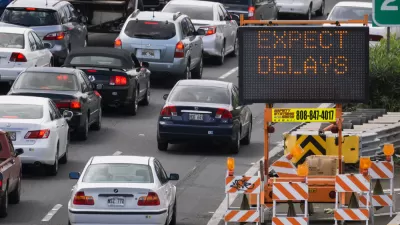The rapid economic growth of North Texas might not translate to economic mobility for many residents if the region can't better connect land use and transportation planning, according to this opinion piece.

Connor Harris, policy analyst at the Manhattan Institute and author of the recent report "Lone Star Slowdown? How Land-Use Regulation Threatens the Future of Texas," contributes a column on the subject of congestion in North Texas for the Dallas Morning News.
As noted by Harris, North Texas is quickly adding, over 100,000 new jobs between February 2018 and February 2019, and unemployment is below the national average. But with that growth comes challenges.
Land-use regulations in some established cities have pushed most of this growth out to the fringes of North Texas, in places like central and northern Collin and Denton counties, creating a serious transportation challenge. According to the consultancy INRIX, the average Dallas driver lost 76 hours every year to traffic congestion in 2018. And suburbs are developing in a way that leaves most people no choice but to drive everywhere — largely the result of regulations that require massive parking lots in every new development, making driving artificially cheap and walking unpleasant.
So travel times are increasing on average, even while travel distances are decreasing on average, and Harris sees reasons that congestion could slow economic mobility for the growing population. Harris's proposed solution: more zoning that allows for apartments in the region's suburbs, especially around DART stations. Still, according to Harris, all suburbs must have a role to overcome the challenges presented by its history of lad use regulations that only allow sprawling, single-family neighborhoods.
Housing prices will never moderate, though, unless suburban municipalities take a fresh look at their public policies. Zoning codes typically prohibit residential development in industrial and commercial zones, for example. Parking minimums, furthermore, require businesses to provide parking lots that can be several times larger than the stores they serve, as well as large amounts of parking — often two spaces per dwelling unit — in residential zones. The amount of land on which any residential development denser than single-family is prohibited, moreover, is almost certainly excessive.
FULL STORY: You can blame suburban zoning rules for your crushing commute

Alabama: Trump Terminates Settlements for Black Communities Harmed By Raw Sewage
Trump deemed the landmark civil rights agreement “illegal DEI and environmental justice policy.”

Study: Maui’s Plan to Convert Vacation Rentals to Long-Term Housing Could Cause Nearly $1 Billion Economic Loss
The plan would reduce visitor accommodation by 25% resulting in 1,900 jobs lost.

Why Should We Subsidize Public Transportation?
Many public transit agencies face financial stress due to rising costs, declining fare revenue, and declining subsidies. Transit advocates must provide a strong business case for increasing public transit funding.

Paris Bike Boom Leads to Steep Drop in Air Pollution
The French city’s air quality has improved dramatically in the past 20 years, coinciding with a growth in cycling.

Why Housing Costs More to Build in California Than in Texas
Hard costs like labor and materials combined with ‘soft’ costs such as permitting make building in the San Francisco Bay Area almost three times as costly as in Texas cities.

San Diego County Sees a Rise in Urban Coyotes
San Diego County experiences a rise in urban coyotes, as sightings become prevalent throughout its urban neighbourhoods and surrounding areas.
Urban Design for Planners 1: Software Tools
This six-course series explores essential urban design concepts using open source software and equips planners with the tools they need to participate fully in the urban design process.
Planning for Universal Design
Learn the tools for implementing Universal Design in planning regulations.
Smith Gee Studio
Alamo Area Metropolitan Planning Organization
City of Santa Clarita
Institute for Housing and Urban Development Studies (IHS)
City of Grandview
Harvard GSD Executive Education
Toledo-Lucas County Plan Commissions
Salt Lake City
NYU Wagner Graduate School of Public Service





























